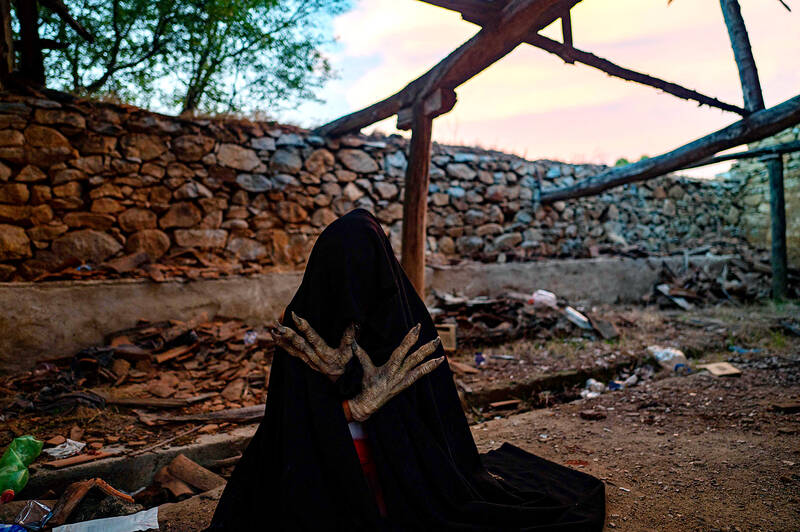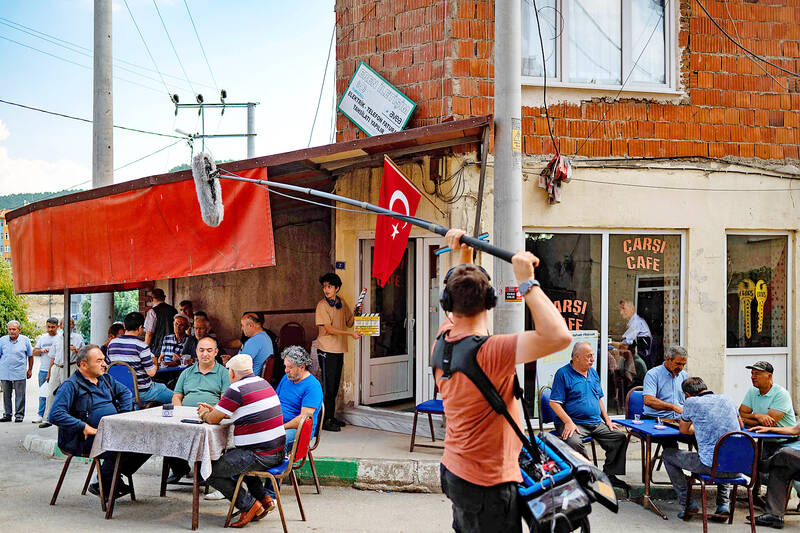Kneeling before a chalk star outside his tumbledown house, an old man performed a ritual to rid himself of evil spirits — which many superstitious Turks believe exist.
Perched behind the camera, director Metin Kuru tried to encourage the actor to convey the sheer agony of being possessed by a genie.
However, there would not be many takes, because Kuru needs to finish his film fast to feed Turkey’s voracious appetite for low-budget horror flicks, with a new supernatural chiller released every week.

Photo: AFP
“At the end of the day, I try to produce films with as few technical issues as possible,” Kuru said between scenes of Muhr-u Musallat 2 — Yasak Dugun (Sealed Invasion 2 — Forbidden Wedding).
Filming many of the scenes in the dark helps.
“The color palette of horror movies is not as varied, which allows filmmakers to shoot with cheaper cameras, less light and smaller crews,” Kuru said.

Photo: AFP
This year alone, 60 new homegrown horror movies are to hit screens in Turkey, where demand for entertainment has not waned despite — or maybe because of — the economic crises gripping the country.
Few horror films were made until the 1990s, their growth coinciding with the rise of Turkish President Recep Tayyip Erdogan’s Islamic-rooted Justice and Development Party.
Its coming to power in 2002 after decades of more secular governments helped let the genie out of the bottle, with more religious Turks — and plenty of secular ones — lapping up superstitious tales that were previously frowned on.

Photo: AFP
Film critic Gizem Simsek Kaya said there might be a link between the horror boom and broader social shifts in Turkey.
“The drive to brush aside superstition and come closer to science [of modern Turkey’s founders] began to regress in the late 1990s,” Kaya said.
Religious-themed horror movies became popular with Buyu (The Spell) in 2004, and reached an even bigger audience with the launch of the big-budget Dabbe series in 2006.
Director Hasan Karacadag made six Dabbe films, the last in 2015, breaking Turkish box office records.
Other blockbusters followed from the equally popular Siccin franchise from director Alper Mestci.
“Some Islamic tendencies and the rising tide of conservatism play a role in this,” Kaya said.
Turkish horror films mostly revolve around jinns or genies — potentially mischievous spirits that are a part of Islamic myths and theology.
This can be tricky for makeup artists like Yesim Vatansever.
Not only are genies supposed to be invisible, but there are also more than 70 types, making depicting them a challenge.
“It would be much easier to visualize, say, an alien,” Vatansever said.
Kaya, who teaches at Istanbul Kultur University, said that vampire movies do not work in Turkey because of religious sensitivities.
The idea of the living dead “in Islam is equal to committing shirk,” or the sin of idolatry, she said.
It might not have helped either that the inspiration for Dracula, the medieval Romanian ruler Vlad the Impaler, got his gory nickname from impaling Turks.
Ghosts and zombies also have issues.
“In Islam, the dead body is only seen covered in a shroud. When you try to resurrect something, it has to remove the shroud and walk naked,” Kaya said.
In one movie, a resurrected man who threw off his shroud put on some trousers he found on the street, she said.
“The moment he did that, the movie turned into a comedy,” she said.
These limitations can make Turkish horror movies look dreadful, she said.
“They are shot in a few days, the equipment is poor, and the film can come out blurry,” she said.
“I had never seen the words ‘error code’ accidentally appear in a movie” until it turned up in a Turkish horror flick this year, she said.
Screenwriter Ozlem Bolukbasi conceded that the films were not cinematic masterpieces.
“The budgets and production values are not high,” she said.
“But do we still draw audiences? Yes, we do,” she added.
Back on set with the old man possessed by a jinn, local villagers had flocked to see the filming.
“It’s fun. The whole town is here at the moment,” said Huseyin Aydemir, who runs a local restaurant in Buyukorhan, near Bursa in northwestern Turkey. “A cemetery scene was shot here two days ago. The locals went to the scene hours before the film crew.”

CHIP WAR: Tariffs on Taiwanese chips would prompt companies to move their factories, but not necessarily to the US, unleashing a ‘global cross-sector tariff war’ US President Donald Trump would “shoot himself in the foot” if he follows through on his recent pledge to impose higher tariffs on Taiwanese and other foreign semiconductors entering the US, analysts said. Trump’s plans to raise tariffs on chips manufactured in Taiwan to as high as 100 percent would backfire, macroeconomist Henry Wu (吳嘉隆) said. He would “shoot himself in the foot,” Wu said on Saturday, as such economic measures would lead Taiwanese chip suppliers to pass on additional costs to their US clients and consumers, and ultimately cause another wave of inflation. Trump has claimed that Taiwan took up to

A start-up in Mexico is trying to help get a handle on one coastal city’s plastic waste problem by converting it into gasoline, diesel and other fuels. With less than 10 percent of the world’s plastics being recycled, Petgas’ idea is that rather than letting discarded plastic become waste, it can become productive again as fuel. Petgas developed a machine in the port city of Boca del Rio that uses pyrolysis, a thermodynamic process that heats plastics in the absence of oxygen, breaking it down to produce gasoline, diesel, kerosene, paraffin and coke. Petgas chief technology officer Carlos Parraguirre Diaz said that in

SUPPORT: The government said it would help firms deal with supply disruptions, after Trump signed orders imposing tariffs of 25 percent on imports from Canada and Mexico The government pledged to help companies with operations in Mexico, such as iPhone assembler Hon Hai Precision Industry Co (鴻海精密), also known as Foxconn Technology Group (富士康科技集團), shift production lines and investment if needed to deal with higher US tariffs. The Ministry of Economic Affairs yesterday announced measures to help local firms cope with the US tariff increases on Canada, Mexico, China and other potential areas. The ministry said that it would establish an investment and trade service center in the US to help Taiwanese firms assess the investment environment in different US states, plan supply chain relocation strategies and

Japan intends to closely monitor the impact on its currency of US President Donald Trump’s new tariffs and is worried about the international fallout from the trade imposts, Japanese Minister of Finance Katsunobu Kato said. “We need to carefully see how the exchange rate and other factors will be affected and what form US monetary policy will take in the future,” Kato said yesterday in an interview with Fuji Television. Japan is very concerned about how the tariffs might impact the global economy, he added. Kato spoke as nations and firms brace for potential repercussions after Trump unleashed the first salvo of